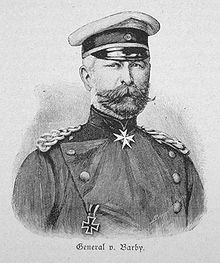Adalbert of Barby
Adalbert Roderich Levin von Barby (born February 20, 1820 in Potsdam , † November 20, 1905 in Loburg ) was a Prussian general of the cavalry .
Life
origin
He was the son of the later Prussian Lieutenant General Wilhelm von Barby (1795-1883) and his wife Pauline Clementine Ulrike, née von Wulffen (1800-1880). The later Prussian Lieutenant General Rudolf von Barby (1821-1906) was his brother.
Military career
From 1831, Barby first visited the cadet houses in Potsdam and Berlin . On August 5, 1837, he was transferred to the Regiment of the Gardes du Corps of the Prussian Army as a second lieutenant . There he served as regimental adjutant from December 1, 1843 to June 1, 1851, and in the meantime was promoted to prime lieutenant in May 1849 . On April 15, 1852, Barby was promoted to Rittmeister and in the years to come he was in command of various squadrons . On May 11th he received the character and on August 24th, 1858 the patent for this rank. For the duration of the mobile relationship on the occasion of the Sardinian War , Barby was a regular staff officer in 1859 and was left in this relationship after the demobilization . On April 26, 1862, he was appointed commander of the Silesian Cuirassier Regiment No. 1 (Prince Friedrich of Prussia) in Breslau . In this capacity Barby was promoted to lieutenant colonel on March 17, 1863 and in spring 1866 to colonel . In the same year he took part with his regiment during the war against Austria in the battle of Königgrätz and the battle of Tobitschau . On 14 July 1866 his cuirassiers were with the education of Kostelez over Proßnitz against Prerov commissioned. This led to the battle at Biskupice , in the course of which Barby at the head of the 1st Squadron crossed an enemy square and suffered only minor losses of his own.
After the Peace of Prague , his association was given the name Leib-Kürassier-Regiment when entering the Breslau garrison and King Wilhelm I awarded Barby the order Pour le Mérite for his achievements on September 20, 1866 . In position à la suite of his regiment, he was transferred to Hanover on January 14, 1868 and appointed commander of the 19th Cavalry Brigade . After the mobilization on the occasion of the war against France , Barby was promoted to major general on July 25, 1870 and led his brigade in the battles at Vionville and Gravelotte, as well as a number of other skirmishes. For his achievements he received both classes of the Iron Cross and after the end of the war was appointed commander of the 20th Cavalry Brigade , which was also stationed in Hanover . From March 14, 1874, he was employed as a commander of Hanover and on September 19, 1874, he was promoted to lieutenant general. In this position, Barby was awarded the Order of the Red Eagle 1st Class with Oak Leaves and the Order of the Crown 1st Class. With his character as a general of the cavalry, he was finally put up for disposal on March 14, 1884 with the award of the cross and star of the Commander of the Royal House Order of Hohenzollern with the statutory pension . To facilitate the transition to retirement, Barby also received a gift of 3,000 thalers.
On August 16, 1903, he was given permission to wear the uniform of the Leib-Kürassier Regiment No. 1.
family
Barby had married Luise Funk von Senfftenau (1830-1867) on July 6, 1853 in Detmold. Several children were born from the marriage. His daughter Anna (* 1855) married Friedrich von Beaulieu-Marconnay (* 1852), chamberlain to the Hereditary Grand Duchess of Oldenburg, in 1876.
literature
- Kurt von Priesdorff : Soldier leadership . Volume 8, Hanseatische Verlagsanstalt Hamburg, undated [Hamburg], undated [1941], DNB 367632837 , pp. 42-43, no. 2473.
- Gothaisches Genealogisches Taschenbuch der Uradelige houses. 1911. Twelfth year, Justus Perthes, Gotha 1910, p. 47.
| personal data | |
|---|---|
| SURNAME | Barby, Adalbert of |
| ALTERNATIVE NAMES | Barby, Adalbert Roderich Levin von (full name) |
| BRIEF DESCRIPTION | Prussian general of the cavalry |
| DATE OF BIRTH | February 20, 1820 |
| PLACE OF BIRTH | Potsdam |
| DATE OF DEATH | November 20, 1905 |
| Place of death | Loburg |
